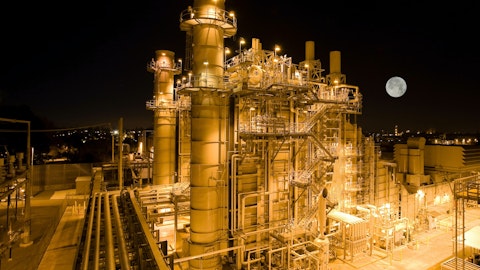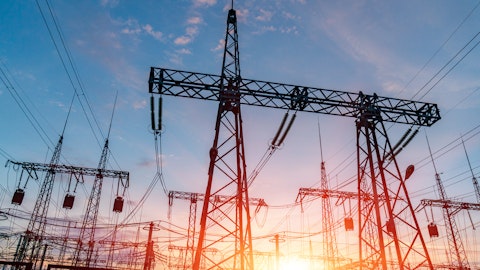So, we’re pleased that Dubai is counting on us to ensure the integrity of their energy system, and we’re pleased to continue that relationship to 2030, if not well beyond. In terms of Express, Express is a different kind of poster child for energy security because the fact of the matter is ADNOC could have any asset they want in the world that has been on an evergreen for some time. I think we’ve highlighted that in fact a couple of years ago. And yes, they count on it. And I’m comfortable that they are not going to let go of that asset anytime soon just because of the new world we live in, and people want to ensure energy security. So it’s another one of those. I talked about some of our markets have maximum throughput. The asset in Pakistan pushed something like 1.25% of global LNG supply to it because they’ve got this huge baseline need.
Abu Dhabi is just a very prudent, very sophisticated energy company knowing they need the reliability of Excelerate’s insurance in case there’s any kind of disruption to a mature energy system like theirs. So, I think the need, the heightened awareness for energy security is driving some of this. And just to clarify, the Explorer extension runs through October of 2030.
Chris Robertson: Okay. Yes, that’s helpful. Yes, I guess the reason I was asking on the Express was more about, from your perspective for optionality, let’s say, looking into these other regions, as you’ve highlighted, there’s maybe an opportunity to go into a higher utilization market. And there’s not too many of the base assets left that have charters rolling off in the near term. So I didn’t know how you thought about the Express potentially going into a different market if an opportunity would arise.
Steven Kobos: Yes. That is something we have and would discuss with ADNOC. I like that relationship, want to maintain that relationship for the long-term. We have, in the past, borrowed the Express seasonally in winter, just like we borrowed the Excelsior from the German government over the past Northern Hemisphere summer. So, we’re always looking at ways to find win-wins, whether that’s bridging to a more permanent asset or not. And you can be sure that we’re having those discussions with ADNOC, just as we would with every customer–
Chris Robertson: Sure. Yes. Last question for me, and I’ll turn it over. Just with regards to Pyra, you saw in the term sheet. I guess, any estimates in terms of time line around kind of next stage part of the process and when there might be kind of a final investment decision there?
Steven Kobos: Yes, I’ll let Dana provide a little more color. But if you think about the next milestones, this was a nonbinding term sheet. It certainly helped us refine a lot of aspects of this project. I mean you would be looking for some intermediate agreements that we would announce, you’d be looking for execution of definitive agreements, you would be looking for EPC contract awards. We previously announced the mandate letter we’ve signed with IFC that is now enforced after this term sheet was a milestone in that mandate letter. So, we’ll also be moving forward under the financing arrangements with our mandated lead arranger. We’re very pleased about that. But those are some of the milestones you’ll be seeing come down the road.
Chris Robertson: Okay. Yes, thanks for the color Steven. We’ll be on the lookout for those. I’ll turn it over. Thank you for your time.
Steven Kobos: Thanks Chris.
Operator: We now turn to turn to Jeremy Tonet with JPMorgan. Your line is open.
Jeremy Tonet: Hi, good morning.
Dana Armstrong: Morning.
Steven Kobos: Hey Jeremy.
Jeremy Tonet: Hi. Just wanted to start off, if I could, with any incremental thoughts you might be able to provide with regards to capital allocation strategy going forward. It seems like there’s a lot of LNG export being built in the world, maybe not quite as much re-gas capacity. So, it seems like there’s quite the need there. At the same time, I guess, some of the other peers might be — might have a higher dividend yield than what Excelerate offers right now. And so just wondering, how you think about balancing these, I guess, competing priorities and overall thoughts on capital allocation?




